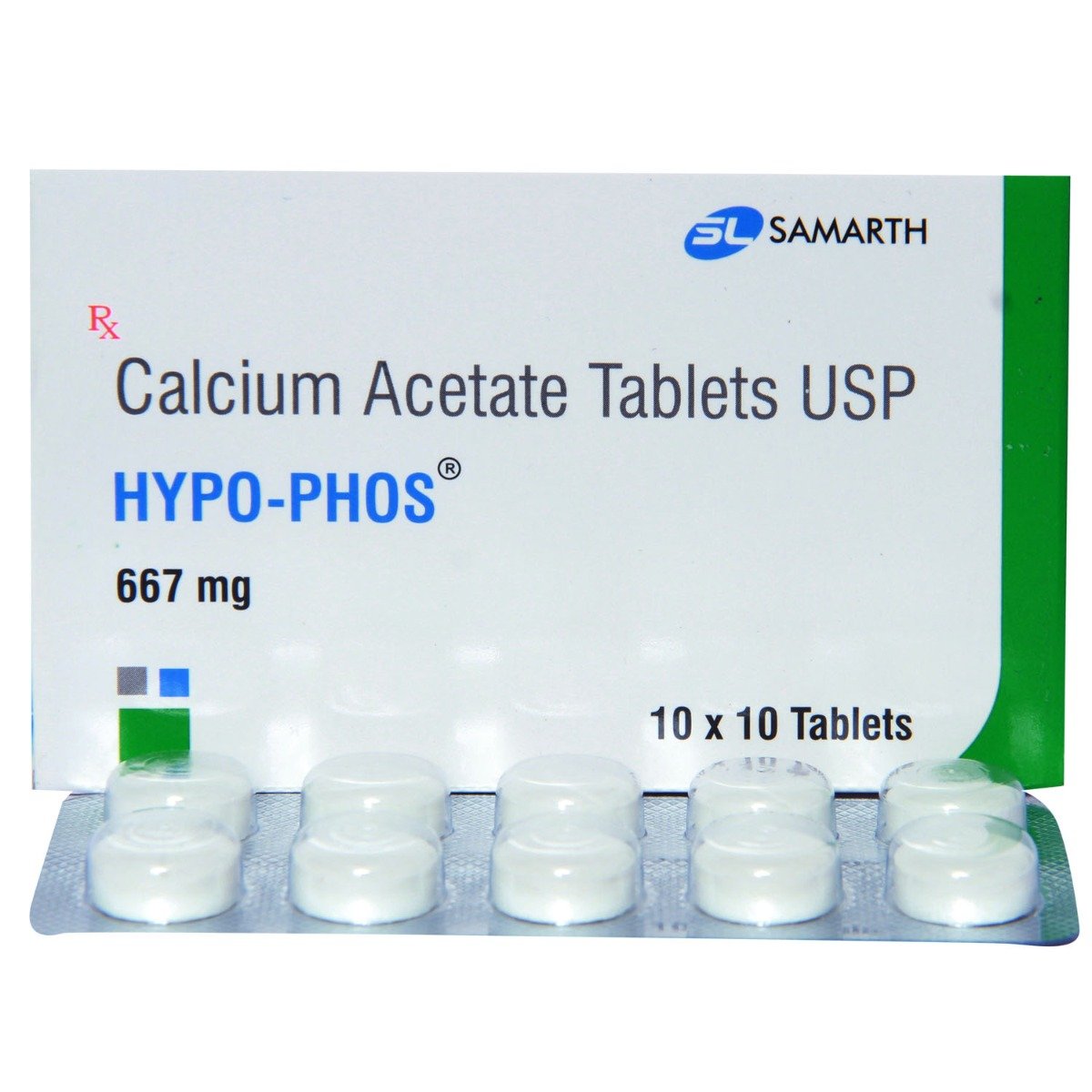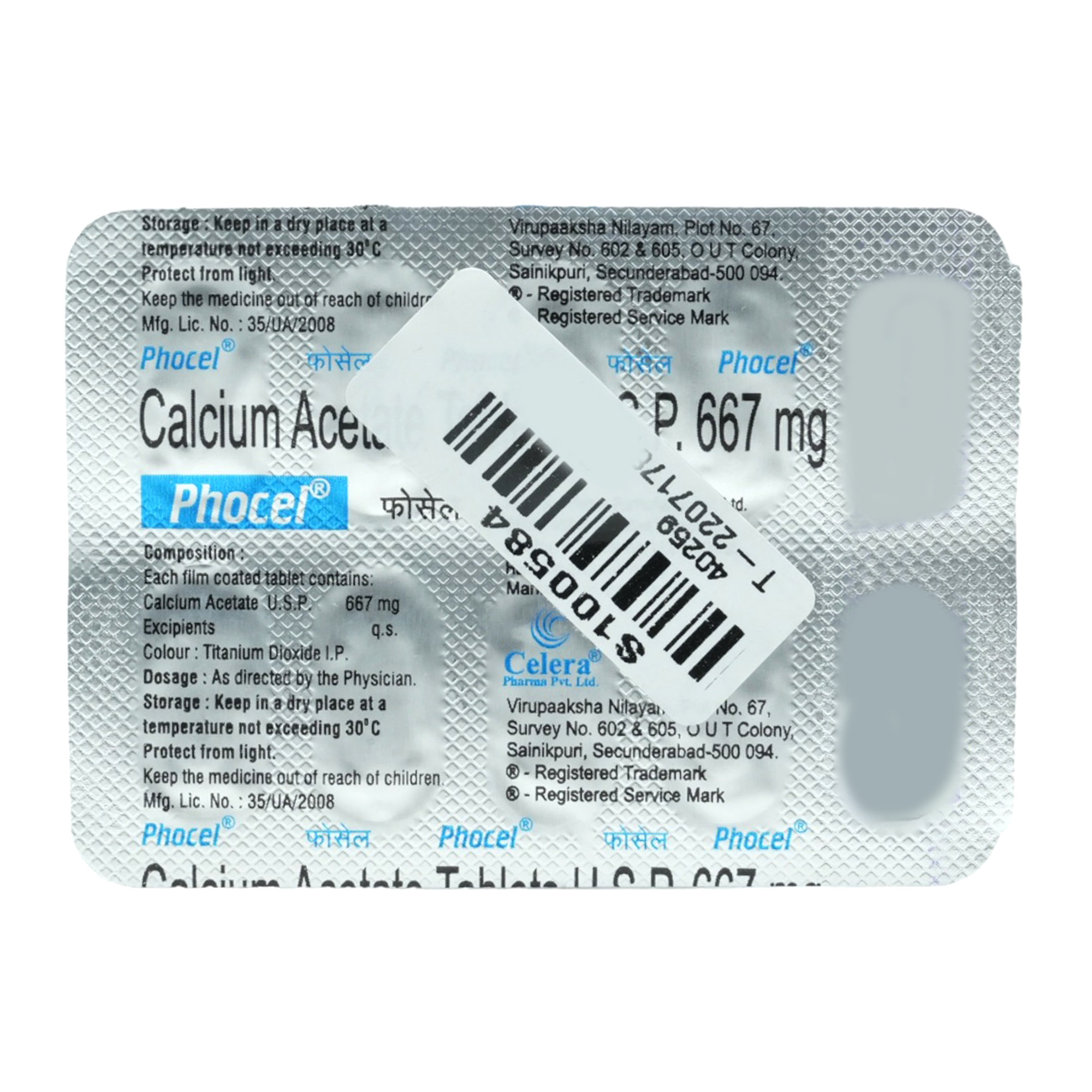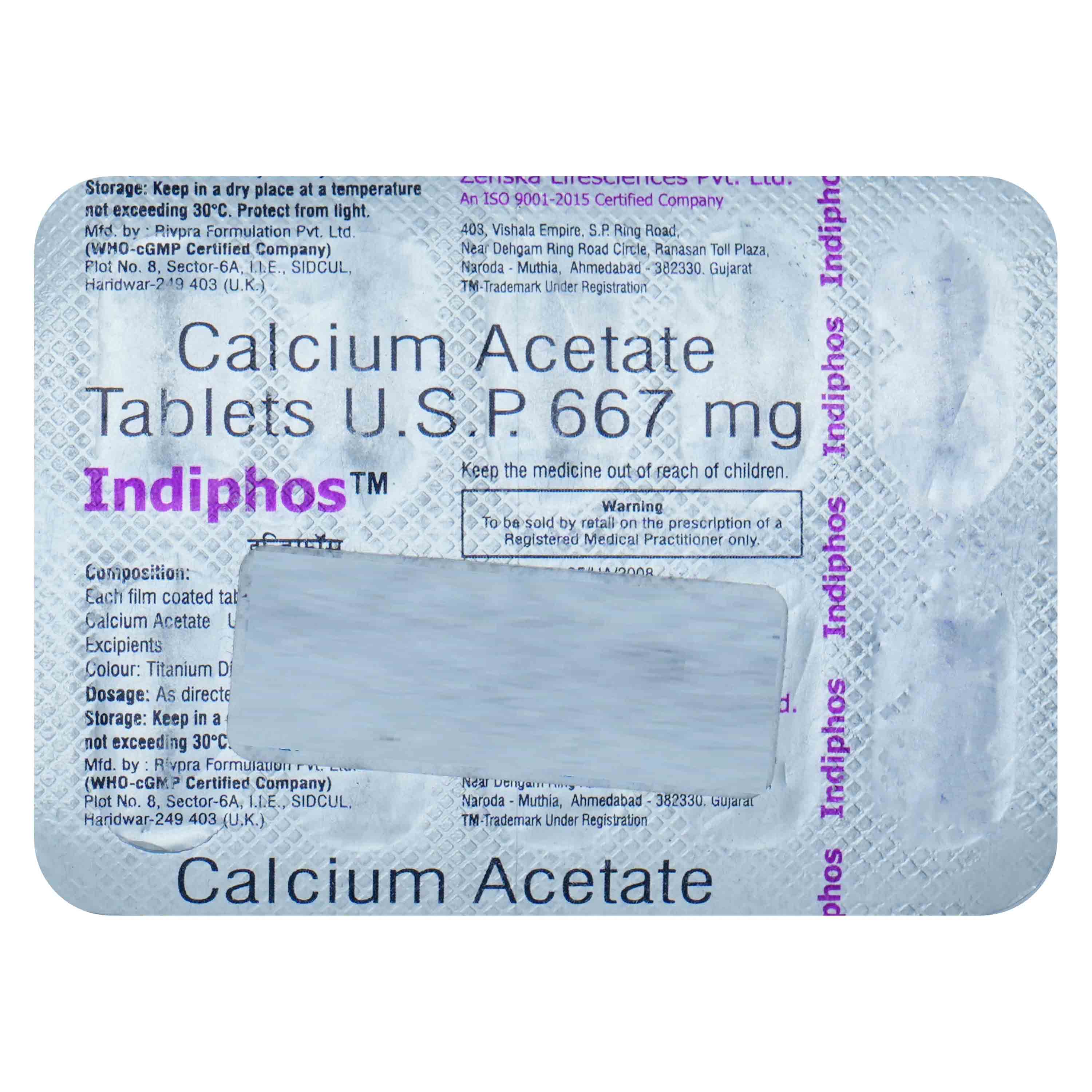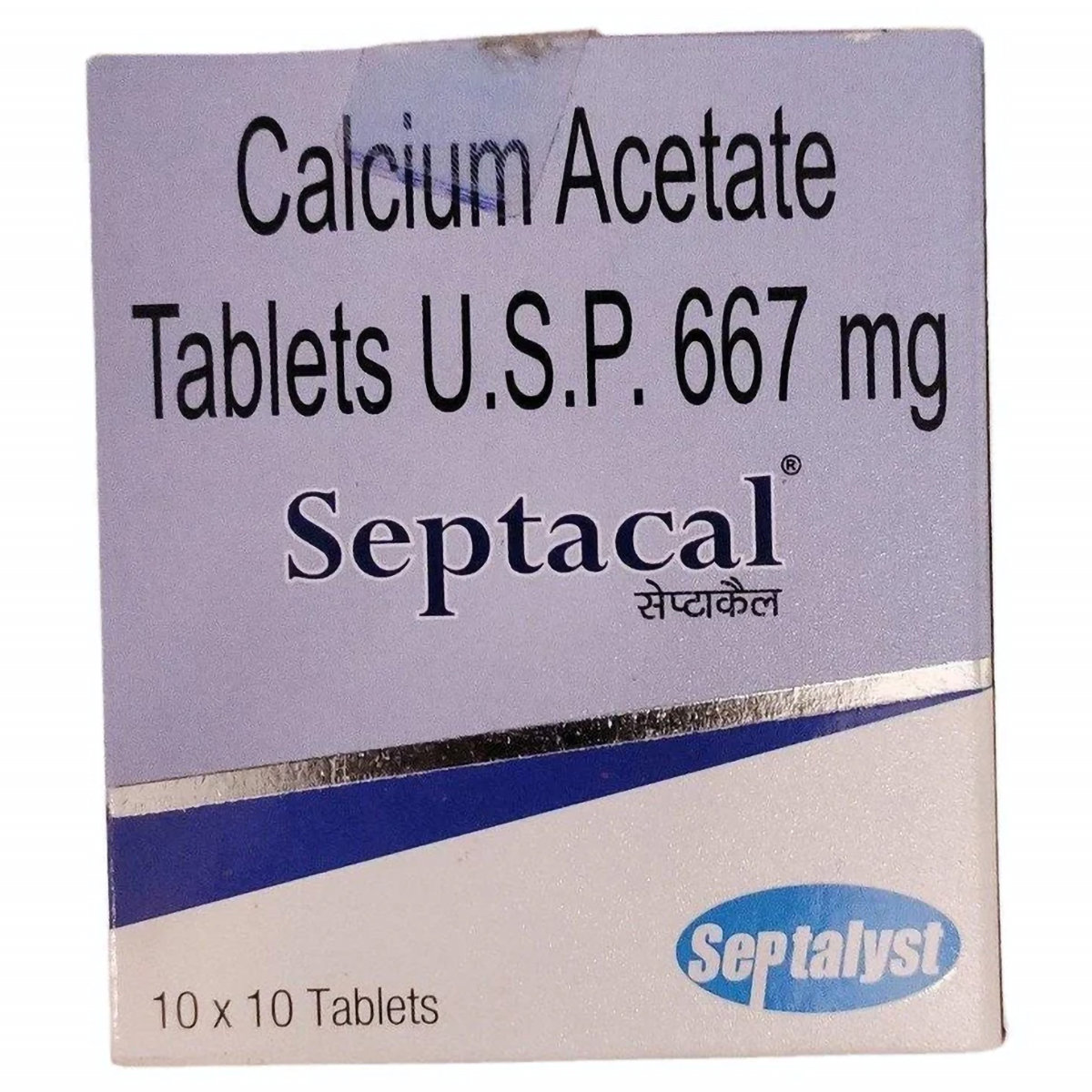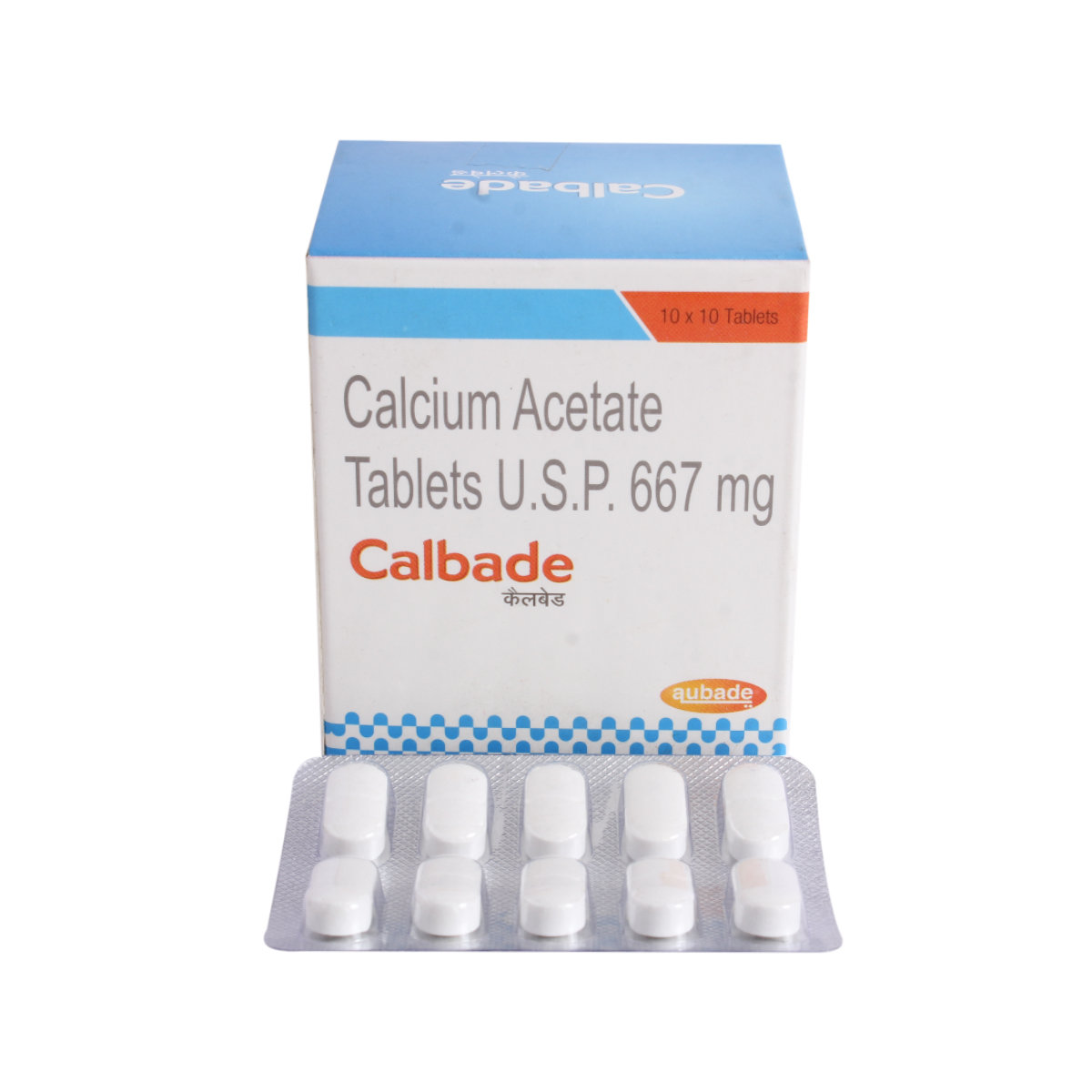- Home
- Phostat Tablet
Phostat Tablet Substitute
Phostat Tablet Substitute
Medicine Composition:
CALCIUM ACETATE-667MGAll Substitutes & Brand Comparisons
RX
Hypophos 677 mg Tablet 10's
Samarth Life Sciences Pvt Ltd
₹18
(₹1.62 per unit)
54% CHEAPERRX
Low Phos 667 mg Tablet 50's
Atlantic Pharmaceuticals Inc
₹117
(₹2.11 per unit)
40% CHEAPERRX
Phocel Tablet 10's
Celera Healthcare Pvt Ltd
₹36.5
(₹3.29 per unit)
7% CHEAPERRX
Indiphos 667 Tablet 10's
Zenska Life Sciences Pvt Ltd
₹39
(₹3.51 per unit)
1% CHEAPERRX
Caligen Tablet 10's
Johnlee Pharmaceuticals Pvt Ltd
₹39
(₹3.51 per unit)
1% CHEAPERRX
Conciphos Tablet 10's
Rencord Life Sciences Pvt Ltd
₹40
(₹3.6 per unit)
1% COSTLIERRX
Clacetate Tablet 10's
Nephurocare Pharma Pvt Ltd
₹42
(₹3.78 per unit)
6% COSTLIERRX
Zerofos Tablet 10's
Auxiliare Healthcare Pvt Ltd
₹43
(₹3.87 per unit)
8% COSTLIERRX
Lanum Tablet 10's
La Renon Healthcare Pvt Ltd
₹46
(₹4.14 per unit)
16% COSTLIERRX
Septacal Tablet 10's
Septalyst Lifesciences Pvt Ltd
₹46.5
(₹4.19 per unit)
17% COSTLIERRX
Calcibind Tablet 10's
Repens Healthcare India Pvt Ltd
₹48.5
(₹4.37 per unit)
22% COSTLIERRX
Calbade 667 mg Tablet 10's
Aubade Healthcare Pvt Ltd
₹52.5
(₹4.73 per unit)
32% COSTLIERRX
Phosbind Tablet 10's
Convina Research Lab Pvt Ltd
₹56
(₹5.04 per unit)
41% COSTLIERRX
Calips-667 Tablet 10's
Psychocare Health Pvt Ltd
₹67
(₹6.03 per unit)
69% COSTLIERRX
Aceium-667 mg Tablet 10's
Rnity Pharmaceutical Pvt Ltd
₹92.5
(₹9.25 per unit)
159% COSTLIER

When Should You Consider Switching from Phostat Tablet ?
Patients may explore substitutes in the following scenarios:
- High monthly cost of Phostat Tablet
- Non-availability in local pharmacies
- Generic recommendation by a doctor
- Side effects or better tolerability with alternatives
What to Know Before Switching
Before you switch from Phostat Tablet to another medicine, here are some important points to keep in mind:
Same salt, different brands:
Most substitutes contain the same active ingredient - CALCIUM ACETATE-667MG, but the fillers, coating, or manufacturing quality may vary slightly.
Consult your doctor first:
Even if the salt is the same, your doctor can confirm if the substitute is right for your condition, dosage, and health history.
Watch out for allergies or reactions:
Some people may react differently to certain brands due to inactive ingredients. If you notice any side effects, inform your doctor immediately.
Price ≠ effectiveness:
A lower-priced substitute doesn't mean it's less effective. Many generic medicines work just as well as branded ones.
Check the dosage form and strength:
Always match the substitute’s strength (e.g., 5mg, 10mg) and form (tablet, capsule, syrup) with what your doctor prescribed.
Uses
Phostat Tablet is used to manage high phosphorus levels in people with kidney problems. The detailed uses of Phostat Tablet are as follows:
- Controls hyperphosphatemia: Phostat Tablet helps lower elevated blood phosphorus levels in patients with chronic kidney disease on dialysis.
- Acts as a phosphate binder: Phostat Tablet binds to dietary phosphorus in the gut, preventing its absorption into the bloodstream.
- Supports mineral balance: Phostat Tablet helps maintain healthier calcium and phosphorus levels to protect bones and blood vessels in kidney disease patients.
Medicinal Benefits
Phostat Tablet belongs to the class of medicines known as phosphate binders. It contains calcium acetate. It is commonly used to treat kidney failure in individuals undergoing regular haemodialysis or continuous ambulatory peritoneal dialysis (CAPD). In kidney failure, the phosphate levels in the blood can be high. Phostat Tablet controls the phosphate levels by removing phosphate from the food in your stomach before it enters the bloodstream. Thus, it helps to prevent the high phosphate levels in the stream.
FAQs
The substitutes of Phostat Tablet contain the same active salt(s) - CALCIUM ACETATE-667MG. However, they may differ in price, manufacturing quality, and inactive ingredients. Speak to your doctor to find a suitable option.
Switching to a generic substitute medicine in the place of Phostat Tablet is often possible if it has the same salt, strength, and dosage form. But always check with your doctor before making any changes to your medication.
Generics versions of Phostat Tablet are typically more affordable because they don’t include the original brand's research, development, and marketing costs. They contain the same active ingredient and are approved for safety and effectiveness.
Most people don’t notice any difference. However, some may react to different fillers or coatings. If you notice any unusual symptoms after switching, consult your doctor.
Make sure the new medicine has the same active salt, strength, dosage form. Always confirm the change with your doctor or pharmacist.
Substitutes of Phostat Tablet meet the same safety and efficacy standards as Phostat Tablet , but small differences in absorption or formulation can exist. A doctor can help you choose the right one for your needs.
Yes. Substitutes of Phostat Tablet may vary in color, size, or shape due to differences in manufacturing and branding, but this does not affect how they work.
Yes, it’s generally safe to switch between multiple substitutes of Phostat Tablet if they have the same salt and strength. However, always inform your doctor so they can monitor how your body responds.
Yes, many people safely use substitutes of Phostat Tablet for long-term treatment. Just ensure it’s done under medical supervision.
If your symptoms stay under control or lab results remain stable, the substitute for Phostat Tablet is likely working well. Regular follow-ups with your doctor are important.
Absolutely. Even with the same salt, small differences can affect how your body responds when switching from Phostat Tablet to its substitute. Always consult your doctor before switching.
Phostat Tablet is used to manage high levels of phosphate in the blood of people with chronic kidney-related concerns. It helps manage high levels of phosphate in the blood and reduces the risk of complications associated with high phosphate levels.
Phostat Tablet controls the phosphate levels by removing phosphate from the food in your stomach before it gets into the bloodstream. Thus, it helps to prevent the high levels of phosphate in the bloodstream.
High phosphorus often does not cause symptoms itself. However, excess phosphorus in your blood can remove calcium from your bones and other body parts, resulting in low calcium (hypocalcemia). Low calcium causes symptoms such as muscle cramps, bone and joint discomfort, weak bones, and itchy skin or rash.
It is not recommended for use if you are allergic to any components present in Phostat Tablet , if you have high levels of calcium in your blood or urine, or if you have low levels of phosphate in your blood.
Doctors will test your blood phosphate level to see if you have excess phosphorus. If your phosphate level is higher than 4.5 mg/dL, your doctor may order additional tests to rule out kidney disease.
Phostat Tablet may cause side effects such as nausea, vomiting, diarrhoea and constipation. If these side effects persist or worsen, please consult your doctor.
Milk, paneer, cheese, curd and other dairy products, chinese cabbage, broccoli and kale are good sources of calcium.
If you have kidney problem or kidney stone, tissue calcification (deposit of calcium in body tissues) and if you are taking water pills, medicine for heart failure or any other calcium containing medicines or supplements, inform your doctor.
Yes, Phostat Tablet is a health supplement and taking too much of it can be harmful. An overdose can cause stomach discomfort. If you think you have taken too much of Phostat Tablet , seek medical help immediately.
A: Taking the Phostat tablet with meals or immediately after a meal is recommended to enhance its effectiveness.
The onset of action varies from person to person. Following your doctor's instructions and monitoring your phosphate levels regularly as per directions for the best result.
It is essential to consult your doctor before stopping any medication. They will determine the duration of treatment based on your specific condition.
Phostat tablet is primarily used for managing hyperphosphatemia in patients with chronic kidney disease. If you have kidney stones, consult your doctor for appropriate treatment options.
Buy best Health & Nutrition products by
SPECIALITY SUPPLEMENTS
Minerals
VITAMINS AND MINERALS
VITAMINS
ADULT NUTRITION
OTHER SUPPLEMENTS
Protein Supplements
OMEGA & FISH OIL
WEIGHT LOSS
KIDS NUTRITION
SEXUAL HEALTH SUPPLEMENTS
BONE & JOINT SUPPLEMENTS
AMINO ACIDS
WELLNESS DRINKS
WEIGHT GAIN
WOMEN HEALTH SUPPLEMENTS
SINGLE VITAMIN
HEALTH FOODS
IMMUNE HEALTH SUPPLEMENTS
MULTIVITAMINS
CARDIAC SUPPLEMENTS
GASTRIC DISORDERS SUPPLEMENTS
WEIGHT LOSS AND WEIGHT GAIN
Vlado Sky Enterprise Pvt Ltd
Sun Pharmaceutical Industries Ltd
Intas Pharmaceuticals Ltd
Abbott India Ltd
Macleods Pharmaceuticals Ltd
Alkem Laboratories Ltd
Mankind Pharma Pvt Ltd
West Coast Pharmaceuticals Pvt Ltd
Emcure Pharmaceuticals Ltd
Lupin Ltd
Meyer Organics Pvt Ltd
Eris Life Sciences Ltd
Nutritionalab Pvt Ltd
Akumentis Healthcare Ltd
Torrent Pharmaceuticals Ltd
Cipla Ltd
Alniche Life Sciences Pvt Ltd
British Biologicals
La Renon Healthcare Pvt Ltd
Micro Labs Ltd
Leeford Healthcare Ltd
Zuventus Healthcare Ltd
Pharmed Ltd
Corona Remedies Pvt Ltd
Dr Reddy's Laboratories Ltd
East West Pharma India Pvt Ltd
Modi Mundipharma Pvt Ltd
Bright Lifecare Pvt Ltd
ABBOTT HEALTHCARE PVT LTD
Koye Pharmaceuticals Pvt Ltd
Apex Laboratories Pvt Ltd
Aristo Pharmaceuticals Pvt Ltd
Indchemie Health Specialities Pvt Ltd
Zydus Healthcare Ltd
DR Johns Lab Pharma Pvt Ltd
Bioceutics Inc
Hindustan Unilever Ltd
Vasu Organics Pvt Ltd
Fourrts India Laboratories Pvt Ltd
Zydus Cadila
Alembic Pharmaceuticals Ltd
USV Pvt Ltd
Elder Pharmaceuticals Ltd
ZYDUS WELLNESS LIMITED
FDC Ltd
Herbs Nutriproducts Pvt Ltd
Morepen Laboratories Ltd
Guardian Healthcare Services Pvt Ltd
Indoco Remedies Ltd
Zee Laboratories Ltd
TTK Healthcare Ltd
Troikaa Pharmaceuticals Ltd
Pulse Pharmaceuticals
Raptakos Brett & Co Ltd
Innovcare Life Sciences Pvt Ltd
Levin Life Sciences Pvt Ltd
Cadila Pharmaceuticals Ltd
Glanbia Performance Nutrition India Pvt Ltd
Linux Laboratories Pvt Ltd
Ajanta Pharma Ltd
Primus Remedies Pvt Ltd
Wockhardt Ltd
Medley Pharmaceuticals Ltd
Sanofi India Ltd
Wanbury Ltd
Adonis Laboratories Pvt Ltd
Hexagon Nutrition Pvt Ltd
Kepler Healthcare Pvt Ltd
Tablets India Ltd
Tas Med India Pvt Ltd
Aareen Healthcare Pvt Ltd
Cadila Healthcare Ltd
Medishri Healthcare Pvt Ltd
Overseas Health Care Pvt Ltd
Radicool Pharmaceuticals Pvt Ltd
Sanatra Healthcare Ltd
Daris Biocare
Elbrit Life Sciences Pvt Ltd
Maxamus Pharma Pvt Ltd
Ordain Health Care Global Pvt Ltd
Panacea Biotec Ltd
Procter & Gamble Health Ltd
Anglo French Drugs & Industries Ltd
Icarus Health Care Pvt Ltd
Nutricia International Pvt Ltd
Patanjali Ayurved Limited
Biovitamins Pvt Ltd
Klm Laboratories Pvt Ltd
Mova Pharmaceutical Pvt Ltd
Ozone Pharmaceuticals Ltd
Signova Pharma
Cachet Pharmaceuticals Pvt Ltd
Med Manor Organics Pvt Ltd
Akesiss Pharma Pvt Ltd
Delcure Life Sciences Ltd
Femura Pharmaceuticals Pvt Ltd
Hs Aldem Healthcare
Ipca Laboratories Ltd
Lincoln Pharmaceuticals Ltd
Lloyd Healthcare Pvt Ltd
SPECIALITY SUPPLEMENT
CALCIUM
Specialty Supplements
VITAMIN D
IRON
VITAMIN B12
VITAMIN B
VITAMIN C
COLLAGEN
FISH OIL OMEGA
Adult Nutrition Drink
MULTIVITAMIN
ZINC
VITAMIN B9
VITAMIN E
Kids Nutrition Drink
WHEY PROTEIN
SEXUAL HEALTH SUPPLEMENT
MAGNESIUM
SPECIALITY NUTRITION DRINK
Protein Powder
VITAMIN B1
SUGAR SUBSTITUTE
Prebiotic & Probiotic
DIABETIC NUTRITION DRINK
Protein Bar
BIOTIN
WEIGHT LOSS
ENERGY DRINK
Fat Burner
PLANT PROTEIN POWDER
WOMEN & MOTHER NUTRITION DRINK
Apple Cider Vinegar
MELATONIN
Lactation Supplements
APPETITE STIMULANT
Flax seed Oil
VITAMIN A
ORS
AMINO ACID
Pregnancy Supplements
Ashwagandha
Meal Replacement
POTASSIUM
Pre Workout
Shilajit
VITAMIN B6
L-Carnitine
VITAMIN K
CURCUMIN
Mass Gainer
CREATINE
Cod Liver Oil
Ayurvedic Capsules
VITAMIN B5
ARGININE
Glutathione
VITAMIN B2
COENZYME Q10
Chromium
Women Nutrition
MILK THISTLE
VITAMIN B3
Appetite Suppressant
Ayurvedic Tablets
Chyawanprash
Kids Gummies
MORINGA
L-Glutamine
SPIRULINA
GARCINIA CAMBOGIA
HERBAL JUICE
Instant Food
WEIGHT GAINER
ALPHA-LIPOIC ACID
DISKETTE
GLUCOSAMINE
GOKSHURA
Tulsi
ANTACID
BCAA Protein Powder
Brahmi
Chocolate
GILOY
NEEM
NUTRITION DRINK
SELENIUM
TRIPHALA
Amla
BREAKFAST CEREAL
GREEN TEA
Honey
IMF STAGE-2
MILKSHAKE
PAIN RELIEF TABLET

